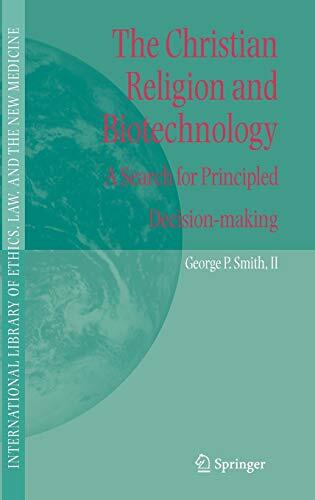
The Christian Religion and Biotechnology: A Search for Principled Decision-making
によって
George P. Smith II
まだ評価がありません
Romance
Religion & Spirituality
Science & Technology
+1
more
形式
ハードカバー
ページ数
274
言語
英語
公開されました
Mar 21, 2005
出版社
Springer
版
2005
ISBN-10
1402031467
ISBN-13
9781402031465
説明
In a world increasingly influenced by advancements in biotechnology, the interplay between religious beliefs and ethical decision-making becomes paramount. George P. Smith delves into this complex relationship, exploring how Christian principles can provide a framework for navigating the moral dilemmas posed by biotechnological breakthroughs. Through careful analysis, he examines the inherent tensions between faith and science, highlighting the necessity of principled guidelines in a rapidly evolving landscape.
The book articulates how religious convictions can guide individuals and communities in making informed choices about medical technologies and genetic interventions. Smith emphasizes the importance of dialogue among theologians, scientists, and ethicists, advocating for collaborative efforts to address the challenges that arise in the fields of medicine and biotechnology. This discourse fosters a deeper understanding of how religious beliefs can inform ethical standards and public policy.
Ultimately, this work serves as both a scholarly investigation and a practical guide, urging readers to consider the profound implications of biotech innovations while remaining anchored in their faith-based values. By blending ethical scrutiny with spiritual insight, Smith invites reflection on how technology can be harnessed for the common good, reinforcing the essential role of religion in shaping a compassionate approach to modern medical dilemmas.
The book articulates how religious convictions can guide individuals and communities in making informed choices about medical technologies and genetic interventions. Smith emphasizes the importance of dialogue among theologians, scientists, and ethicists, advocating for collaborative efforts to address the challenges that arise in the fields of medicine and biotechnology. This discourse fosters a deeper understanding of how religious beliefs can inform ethical standards and public policy.
Ultimately, this work serves as both a scholarly investigation and a practical guide, urging readers to consider the profound implications of biotech innovations while remaining anchored in their faith-based values. By blending ethical scrutiny with spiritual insight, Smith invites reflection on how technology can be harnessed for the common good, reinforcing the essential role of religion in shaping a compassionate approach to modern medical dilemmas.